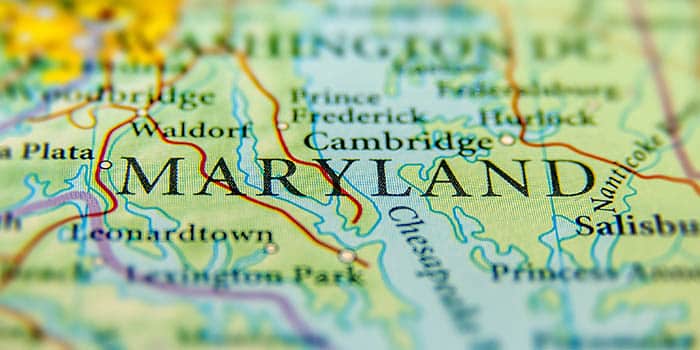
Maryland Considers Ban on Online Sports Betting in Proposed Legislation
Maryland lawmakers are currently discussing a significant change to the state’s gaming industry with the introduction of Senate Bill 1033. This bill, led by Senator Joanne Benson, aims to prohibit online sports betting starting from January 1, 2026, while still allowing retail sportsbooks to operate. Additionally, the bill includes provisions to refund application fees to certain licensed operators who may be affected by this transition.
Impact of Sports Betting on Tax Revenues
The proposal to ban online sports betting has sparked intense debates, especially considering the substantial tax revenue that sports betting has generated for Maryland’s economy. Between July 2024 and January 2025, sports betting contributed nearly $55 million in tax revenue to the state. Governor Wes Moore has proposed increasing the tax rate on sportsbook operators from 15% to 30% in his recent budget plan to help alleviate Maryland’s nearly $3 billion budget deficit.
Despite the push to eliminate online sports betting, it is unlikely that this proposal will gain enough support from Maryland lawmakers due to the state’s financial challenges. The potential loss of millions in tax revenue raises concerns about how the state will make up for the sudden deficit, potentially putting essential community programs at risk.
Critics of Senate Bill 1033 have highlighted several key issues with the proposed legislation. The bill lacks clear measures to prevent the expansion of illegal betting markets that could arise if legal operators are banned. A blanket prohibition could drive gamblers to unregulated offshore websites, posing risks to consumer protection and revenue collection efforts.
Economic Realities and Challenges in Vermont
A similar effort to ban online sports betting is underway in Vermont with House Bill H.133, introduced on February 4, 2025. This bill aims to restrict online sports betting due to concerns about the social costs of gambling and its impact on disadvantaged communities, despite ongoing efforts to address problem gambling in the state.
Like Maryland, Vermont is also facing financial difficulties, leading policymakers to question the wisdom of eliminating a growing revenue source. Around 30% of Vermont’s sports betting activity comes from out-of-state players, marking a shift from previous trends of Vermont residents crossing state lines to place bets.
Given the financial pressures in both Maryland and Vermont, as well as the nationwide trend towards legalizing sports betting, both bills are likely to face challenges. While concerns about problem gambling and social costs are valid, the economic realities suggest that these bills may encounter significant opposition. Without viable alternatives to replace lost revenues, online sports betting is expected to remain a significant aspect of the gaming industry.
การพิจารณาการห้ามการเดิมพันกีฬาออนไลน์ในรัฐเมริแลนด์ในร่างกฎหมายที่เสนอ
นักสมาชิกสภารัฐเมริแลนด์กำลังพิจารณาการเปลี่ยนแปลงที่สำคัญในอุตสาหกรรมการพนันของรัฐด้วยการนำเสนอร่างรัฐบาล 1033 โดยคุณสมบัติโจแอน บีนสัน ซึ่งมีเป้าหมายที่จะห้ามการเดิมพันกีฬาออนไลน์ตั้งแต่วันที่ 1 มกราคม 2026 ในขณะที่ยังอนุญาตให้ร้านหนังสือเดิมพันกีฬาขายของได้ต่อไป นอกจากนั้น ร่างรัฐบาลยังมีข้อบังคับให้คืนเงินค่าใช้จ่ายในการสมัครให้กับผู้ประกอบการที่ได้รับใบอนุญาตบางส่วนซึ่งอาจได้รับผลกระทบจากการเปลี่ยนแปลงนี้
ผลกระทบของการเดิมพันกีฬาต่อรายได้จากภาษี
การเสนอห้ามการเดิมพันกีฬาออนไลน์ได้เริ่มกระตุ้นการอภิปรายอย่างรุนแรงโดยเฉพาะถึงรายได้จากภาษีที่มีมูลค่ามากที่ออกมาจากการเดิมพันกีฬาสำหรับเศรษฐกิจของรัฐเมริแลนด์ ระหว่างเดือนกรกฎาคม 2024 ถึงมกราคม 2025 การเดิมพันกีฬามีส่วนร่วมในรายได้จากภาษีเกือบ 55 ล้านเหรียญสหรัฐให้กับรัฐ ผู้ว่ารัฐวาส มูร์ ได้เสนอเพิ่มอัตราภาษีให้กับผู้ประกอบการร้านหนังสือเดิมพันกีฬาจาก 15% เป็น 30% ในแผนงบประมาณล่าสุดของรัฐเพื่อช่วยเบราเซอร์วิถีของรัฐเมริแลนด์ที่มียอดขาดทุนในขนาดเกือบ 3 พันล้านเหรียญสหรัฐ
แม้จะมีการผลักดันในการกำจัดการเดิมพันกีฬาออนไลน์ แต่น่าจะไม่น่าจะได้รับการสนับสนุนเพียงพอจากนักสมาชิกรัฐเมริแลนด์เนื่องจากอุปสรรคทางการเงินของรัฐ การสูญเสียของรายได้จำนวนล้านบางอย่างยังเป็นปัญหาเนื่องจากไม่ทราบว่ารัฐจะทำอย่างไรเพื่อชดเชยข้อบกพร่องที่เกิดขึ้นอย่างรวดเร็ว ซึ่งอาจทำให้โปรแกรมชุมชนที่สำคัญต่างๆ ต้องเสี่ยงอยู่ในอันตราย
วิจารณ์ของร่างรัฐบาล 1033 ได้เน้นข้อจำกัดที่สำคัญของข้อบังคับที่เสนอ ร่างรัฐบาลขาดมาตรการชัดเจนในการป้องกันการขยายตลาดการเดิมพันที่ผิดกฎหมายที่อาจเกิดขึ้นหากผู้ประกอบการที่ได้รับใบอนุญาตถูกห้าม การห้ามอย่างทั่วไปสามารถทำให้นักพนันไปยังเว็บไซต์นอกพรมแดนที่ไม่ได้รับการควบคุม ซึ่งอาจเสี่ยงต่อความปลอดภัยของผู้บริโภคและความพยายามในการเก็บรายได้
สถานการณ์เศรษฐกิจและความท้าทายในรัฐเวอร์มอนต์
มีการพยายามที่คล้ายกันในการห้ามการเดิมพันกีฬาออนไลน์ในรัฐเวอร์มอนต์ด้วยร่างรัฐบาล เฮ้าส์บิล 133 ซึ่งถูกนำเสนอเมื่อวันที่ 4 กุมภาพันธ์ 2025 ร่างรัฐบาลนี้มีเป้าหมายที่จะ จำกัดการเดิมพันกีฬาออนไลน์เนื่องจากข้อกังวลเกี่ยวกับค่าใช้จ่ายทางสังคมจากการพนันและผลของมันต่อชุมชนที่ไม่เท่าเทียม แม้ว่ามีความพยายามต่อมการจัดการในการเล่นพนันปัญหาในรัฐ
เช่นเดียวกับรัฐเมริแลนด์ เวอร์มอนต์ก็เผชิญกับความยากลำบากทางการเงินซึ่งทำให้นักการเมืองต้องเสี่ยงถึงความสมรอยของการลบแหล่งรายได้ที่กำลังเติบโต ประมาณ 30% ของกิจกรรมการเดิมพันกีฬาในเวอร์มอนต์มาจากผู้เล่นนอกสถานที่ ทำให้มีการเปลี่ยนแปลงจากแนวโน้มเดิมของผู้ถูกใจในเวอร์มอนต์ที่ไปข้ามสายรัฐเพื่อวางเดิมพัน
ด้วยความกดดันทางการเงินที่มีอยู่ทั้งในรัฐเมริแลนด์และเวอร์มอนต์ รวมถึงแนวโน้มของการจำกัดการเดิมพันกีฬาออนไลน์ระดับชาติ ทั้งสองร่างรัฐบาลมีความน่าจะเป็นที่จะต้องเผชิญกับความท้าทาย แม้ว่าความกังวลเกี่ยวกับการพนันปัญหาและค่าใช้จ่ายทางสังคมจะมีความถูกต้อง แต่สถานการณ์เศรษฐกิจชี้ให้เห็นว่าร่างรัฐบาลเหล่านี้อาจพบกับการต่อต้านที่สำคัญ โดยไม่มีทางเลือกที่เหมาะสมในการแทนที่รายได้ที่สูญเสีย การเดิมพันกีฬาออนไลน์ยังคงเป็นส่วนสำคัญของอุตสาหกรรมการพนัน















